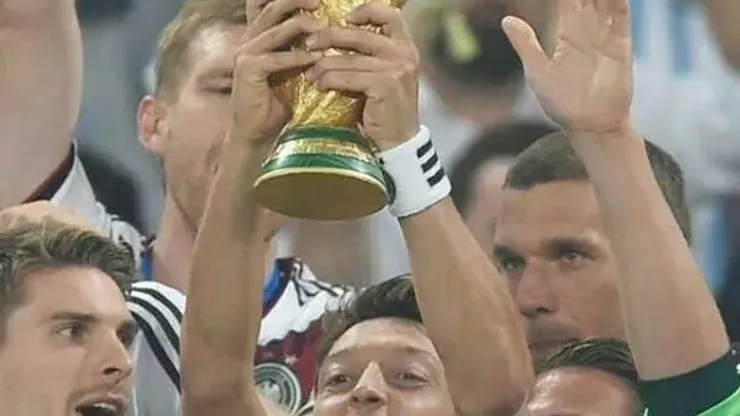Mesut Özil was heavily criticized during this World Cup from just about every corner of the soccer world. Arsenal’s record signing endured a stop-start campaign at the Emirates and his indifferent form spilled over into the German side. In the buildup towards the World Cup speculation was rife that Özil would be dropped by Manager Jogi Löw. While a pre-tournament injury to Marco Reus cemented the starting position for the Gunners midfielder, Özil’s play in the Group Stage was considered disappointing by many, but he continued to play just about every minute for an extremely deep and talented German side. But despite constant critiques Löw persisted with playing Özil for every minute of every game until Germany was in a winning position.
The way Germany plays depends on a creative force in midfield that can unlock defenders and keep the ball moving. Löw’s system as it played out in the knock-out stages of the World Cup depends heavily on the touches that Özil takes on the ball in the final third. The Arsenal man’s ability to drift into wide areas to linkup with his midfield mates as well as his ability to dribble past defenders makes him a unique player in the German setup. Reus is the most similarly styled player Germany has currently, but his injury made Özil’s presence critical.
Despite playing well in three knock-out stage games, Özil continued to receive lots of criticism back home in Germany, and among the English press many of whom were unimpressed with his first Arsenal campaign. Maybe the expectation level for the player, based on his scintillating 2010 World Cup where his pace and creativity were on full display was completely misguided. Why? Since that World Cup and the 2012 Euros when he was again outstanding, the player has added different attributes to his game. The touches on the ball the ability to play a more free-flowing style based around quick passing and movements have made Özil even more effective in subtle ways.
But many in the media have failed to note this shift. Özil has gone from an explosive counter-attacking threat with bouts of creativity to a complete possession oriented attacking midfield player. These attributes explain why Jogi Löw persisted despite the critics in playing him in every important moment of this World Cup. This also helps to explain why Arsene Wenger passed on the opportunity to bring Cesc Fabergas back to Arsenal at a price that would have been lower than what the Gunners paid Real Madrid in 2013 for Özil
In Sunday’s World Cup final, Özil was outstanding. His touches on the ball were nearly perfect, his movement against a well-drilled and organized Argentine back line almost flawless. Özil’s movement coupled with that of Thomas Müller and André Schürrle began the process of unlocking the Argentine defense in the second half. A flawed tactical change from Argentina created even more space and while Germany was having a hard time delivering final balls in the area, Özil and his teammates seemed in control of the match from about the 75th minute onward.
Even on Sunday night as social media lit up with congratulations to the German players, scorn was reserved for Özil in some quarters. But as the player pointed out before the World Cup the only people he needs to please are Arsene Wenger and Jogi Löw, and no doubt both men are happy with his high level of performance.
200+ Channels With Sports & News
- Starting price: $33/mo. for fubo Latino Package
- Watch Premier League, Women’s World Cup, Euro 2024 & Gold Cup
The New Home of MLS
- Price: $14.99/mo. for MLS Season Pass
- Watch every MLS game including playoffs & Leagues Cup
Many Sports & ESPN Originals
- Price: $10.99/mo. (or get ESPN+, Hulu & Disney+ for $14.99/mo.)
- Features Bundesliga, LaLiga, Championship, & FA Cup
2,000+ soccer games per year
- Price: $5.99/mo
- Features Champions League, Serie A, Europa League & Brasileirāo
175 Premier League Games & PL TV
- Starting price: $5.99/mo. for Peacock Premium
- Watch 175 exclusive EPL games per season






